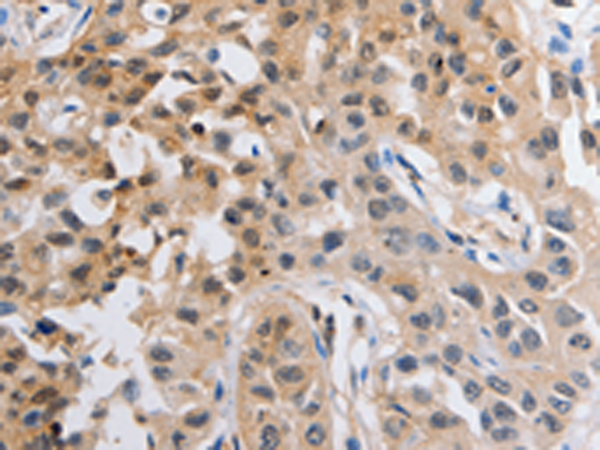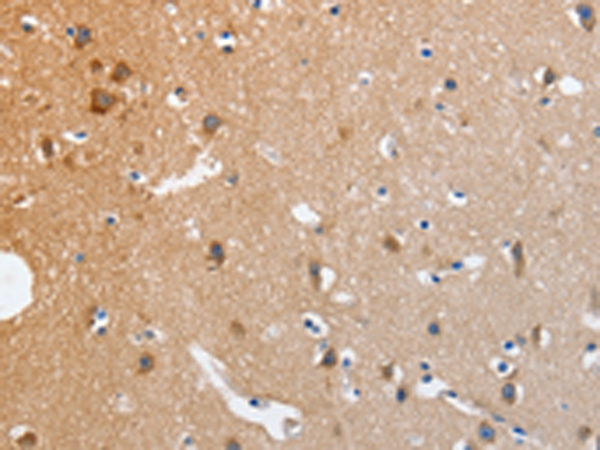


| WB | 1/500-1/2000 | Human,Mouse,Rat |
| IF | 咨询技术 | Human,Mouse,Rat |
| IHC | 1/10-1/50 | Human,Mouse,Rat |
| ICC | 技术咨询 | Human,Mouse,Rat |
| FCM | 咨询技术 | Human,Mouse,Rat |
| Elisa | 1/2000-1/5000 | Human,Mouse,Rat |
| Aliases | NCK, nck-1, NCKalpha |
| WB Predicted band size | 43 kDa |
| Host/Isotype | Rabbit IgG |
| Antibody Type | Primary antibody |
| Storage | Store at 4°C short term. Aliquot and store at -20°C long term. Avoid freeze/thaw cycles. |
| Species Reactivity | Human, Mouse |
| Immunogen | Fusion protein of human NCK1 |
| Formulation | Purified antibody in PBS with 0.05% sodium azide and 50% glycerol. |
+ +
以下是关于NCK1抗体的3篇参考文献及其摘要概括:
1. **文献名称**:*Nck1 mediates the cortical actin assembly required for ligand-induced endocytosis of the epidermal growth factor receptor*
**作者**:Wang et al. (2017)
**摘要**:该研究利用NCK1特异性抗体,通过免疫共沉淀和Western blot分析,揭示了NCK1在EGFR内吞过程中调控皮层肌动蛋白重组的作用。实验表明,NCK1缺失会抑制EGF诱导的受体内化,提示其作为衔接蛋白在细胞信号传导中的关键功能。
2. **文献名称**:*Nck1 deficiency impairs T cell migration and immunity by dysregulating Rho GTPase signaling*
**作者**:Simón-Carrasco et al. (2018)
**摘要**:通过在小鼠模型中使用NCK1抗体进行免疫组织化学和流式细胞术,研究发现NCK1通过激活Rho家族GTP酶(如Cdc42)调控T细胞迁移。NCK1缺失导致T细胞趋化功能受损,加剧了病原体感染模型中的免疫缺陷。
3. **文献名称**:*The adaptor protein Nck1 regulates pancreatic cancer progression by modulating oncogenic kinase signaling*
**作者**:Bladt et al. (2014)
**摘要**:该研究采用NCK1抗体进行免疫印迹和免疫荧光分析,发现NCK1在胰腺癌中高表达,并与PDGFR、FAK等激酶相互作用促进肿瘤侵袭转移。抑制NCK1可显著降低癌细胞在体外和体内的迁移能力。
以上文献均通过NCK1抗体的实验手段,揭示了其在细胞信号传导、免疫调控及癌症进展中的生物学机制。
The NCK1 antibody is a crucial tool for studying the Nck1 protein, an intracellular adaptor protein involved in signal transduction pathways. NCK1 (Non-catalytic region of tyrosine kinase adaptor protein 1) belongs to the NCK family, which includes NCK1 and NCK2. These proteins contain SH2 and SH3 domains, enabling interactions with phosphorylated tyrosine residues and proline-rich motifs, respectively. NCK1 plays a role in regulating cytoskeletal dynamics, cell migration, and growth factor signaling by bridging receptor tyrosine kinases (e.g., EGFR, PDGFR) and downstream effectors like RAS-MAPK or PI3K-AKT pathways.
NCK1 antibodies are widely used in research to detect protein expression, localization, and interactions via techniques such as Western blotting, immunofluorescence, or co-immunoprecipitation. They help elucidate NCK1's role in physiological processes (e.g., embryonic development, immune response) and diseases, including cancer metastasis, neurological disorders, and immune dysregulation. Commercially available NCK1 antibodies are typically polyclonal or monoclonal, raised against specific epitopes (e.g., human NCK1 N-terminal regions). Validation via knockout cell lines or siRNA knockdown is critical to ensure specificity.
Dysregulation of NCK1 is linked to pathological conditions, making its antibody a valuable tool for mechanistic studies and potential therapeutic targeting. Researchers also explore its utility in biomarker discovery or drug development for NCK1-associated diseases.
×